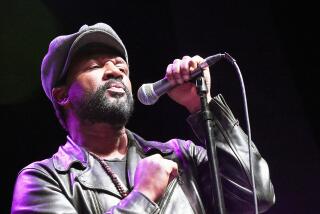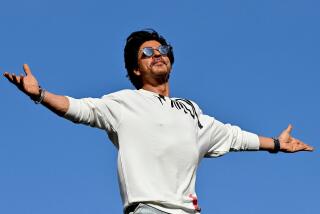Bollywood star Shah Rukh Khan complains of shabby treatment at U.S. airport
- Share via
NEW DELHI — Shahrukh Khan was facing questions again Tuesday, this time from India’s hyperactive celebrity media. The actor may not be a household name in the United States, but in India he’s known as “King Khan,” a heartthrob, a Bollywood megastar.
So everyone wanted to hear Khan’s version of his controversial encounter with U.S. customs officials who, instead of treating him with the reverence he’s afforded at home, had pulled him from a Newark, N.J., airport line for special screening last week as he tried to enter the United States.
Fans were outraged by the perceived slight to a national icon. Government ministers threatened reprisals. And Indian news media eagerly fanned the controversy, with some suggesting that Khan had highlighted the incident as a publicity stunt for his new movie, “My Name Is Khan.”
The movie is about the discrimination Muslims have faced in the United States since the Sept. 11 attacks.
Khan returned to Mumbai, India, on Tuesday and, at a news conference that lasted nearly as long as his secondary questioning in Newark, said he had been asked “bizarre” questions by U.S. officials who wanted to know whether anyone in the U.S. could vouch for his identity.
But the 43-year-old actor appeared to soften his initial criticism of U.S. officials, describing the screening process as discriminatory and embarrassing but “no big deal.” And he dismissed suggestions that he was trying to draw attention to his movie.
“I don’t mean to sound pompous,” the actor said, “but Shahrukh Khan doesn’t need publicity.
“I am too big a star for that.”
The Muslim actor, who is married to a Hindu, has starred in more than 50 Hindi films, many involving stories in which love trumps bigotry. He has won 13 Filmfare awards, India’s equivalent of the Oscars.
In 2008, Newsweek named him the world’s biggest movie star and one of its 50 most influential people, ahead of Oprah Winfrey, the Dalai Lama and Osama bin Laden. By some estimates, Bollywood enjoys 3.6 billion fans globally compared with Hollywood’s 2.5 billion.
In recent months, Khan has traveled repeatedly to Los Angeles, San Francisco and New York to shoot “My Name Is Khan,” without customs problems. He was on his way to Chicago on Friday to attend a celebration of Indian Independence Day when he was asked to step aside while entering the country at Newark Liberty International Airport. He initially attributed the extra questioning to his Muslim name and South Asian origin.
“Routine security procedures weren’t followed,” he said. Officials could have compared his fingerprints and retina scan against data on file, he pointed out, adding, “We should not be treated on the basis of our color or nationality.”
The incident is “as absurd as Brad Pitt coming to India, being strip-searched, investigated and interrogated,” Bollywood director Karan Johar wrote on his blog.
Khan’s treatment hit a nerve with upwardly mobile Indians who have faced enhanced and sometimes intrusive scrutiny since 2001 when trying to enter the U.S. to attend school, visit relatives or participate in business meetings. His popularity also guaranteed that millions of less well-heeled fans heard his complaint.
“This has definitely done huge damage to the U.S. reputation in India,” said Shyamal Sengupta, a professor at the Whistling Woods International film school in Mumbai.
The incident could lead “to a festering belief, erroneously, that this is the act of an arrogant, racist society,” the Indian Express newspaper said in an editorial. “This apparently minor problem could have very major implications.”
Hoping to turn perceptions around, U.S. Ambassador Timothy J. Roemer said through a spokesman that Khan had millions of American fans and was always welcome. U.S. customs officials denied that Khan was detained or discriminated against and said normal procedure was followed, noting that his delay lasted longer than necessary because the airline could not locate Khan’s luggage.
The star was eventually allowed to make one phone call. He reached a parliamentarian in India, who alerted the Indian Consulate, which quickly sorted things out.
The anger directed at the U.S. was accompanied by some criticism of Khan as well.
“Shahrukh Khan is an actor,” said Sajid Wadood of New Delhi’s India Islamic Cultural Center, suggesting the anger was feigned to pump up the box office. “I think he’s acting.”
Others accused Khan of behaving petulantly. Indian film and sports stars usually receive VIP treatment at Indian airports, and in his news conference Tuesday, Khan sought to deflect criticism that he had merely been upset by not being given special status. His celebrity allowed him to highlight the treatment ordinary people face daily at U.S. borders, he said.
The U.S. has every right to defend its borders, Khan said, dressed in a gray V-neck shirt and dark glasses. But it might want to balance that against a greater openness toward peoples around the world, he said.
India’s freewheeling news media paired the alleged indignities visited on Khan with other incidents in recent years involving prominent Indians, which include the detention of actor Irrfan Khan at Los Angeles International Airport, the frisking of former President A.P.J. Abdul Kalam by Continental Airlines staffers in New Delhi and the partial undressing -- some said strip searching -- of former Defense Minister George Fernandes.
But some analysts said the media had blown the issue out of proportion. “You can’t expect [customs officials] to know each and every actor or celebrity,” said Bhaskara Rao, chairman of the Center for Media Studies, a New Delhi-based watchdog group.
At the end of his news conference, Khan called for journalists to find another story.
“We need to forget about it and move forward,” he said. “This should die today . . . or maybe tomorrow.”
He would visit America again, he said, if he had to for work. “But I will go less often.”
--
Anshul Rana of The Times’ New Delhi Bureau contributed to this report.
More to Read
Sign up for Essential California
The most important California stories and recommendations in your inbox every morning.
You may occasionally receive promotional content from the Los Angeles Times.













